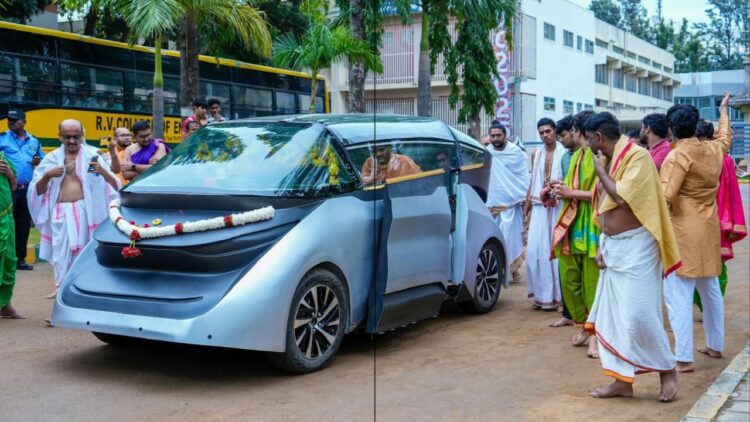The innovation in the field of autonomous driving has been growing rapidly in various parts of the world, including India
In a rather impressive occurrence, Wipro and students of RV College of Engineering collaborated to create the first-ever driverless car in Bengaluru. In the last few years, I have captured and reported innumerable instances of Indian college students or automobile professionals coming up with incredibly creative ideas to deploy and leverage access to the latest technology. This includes things like hubless autonomous electric bikes, autonomous cars, electric cars, electric two-wheelers, etc. For now, let us take a look at the details of this recent case.
Wipro and College Students Build First-Ever Driverless Car in Bengaluru
The visuals and details of this case are being circulated on the internet. We see a striking design of the vehicle with sharp elements at the front, including the bonnet and bumper sections. On the sides, we witness elegant alloy wheels and sliding doors. Also, it looks like the vehicle gets a glass roof. To test the autonomous driving capabilities, a famous sage, Sri Satyatmatheertha Swamiji of the Uttaradi Matha, took the passenger seat and rode the concept car along with other people. This brief ride will serve as a proof of concept for real-world application going forward.
According to an NDTV report, the official launch is slated for the coming months. At the moment, the team is conducting detailed mapping and studying the Indian road conditions to ensure that the car can operate safely. Furthermore, this initiative is a collaborative effort between Wipro, the Indian Institute of Science (IISc), and RV College of Engineering under the WIRIN (Wipro-IISc Research and Innovation Network) program. For the uninitiated, WIRIN focuses on advancing next-generation technologies through research, innovation, and practical applications.
This partnership between Wipro and IISc aims to work on a diverse range of modern-day technologies, including collaborative research in artificial intelligence, robotics, and human-machine interaction. RV College contributes engineering expertise for developing the autonomous vehicle. Other areas are autonomous systems, AI and machine learning, data science and cybersecurity, smart materials, and disruptive design and manufacturing. The time for a widespread application and development of autonomous driving technology is here.
Editor’s Note
Yatharth Chauhan, Managing Editor
As someone who has closely tracked India’s automotive evolution for over 15 years, I see this collaboration between Wipro, IISc, and RV College as a defining moment for indigenous innovation. The successful testing of a driverless car in Bengaluru proves that India’s talent pool is no longer limited to software or IT – it’s now pushing boundaries in advanced mobility. While mass adoption of autonomous vehicles here remains some distance away, such projects clearly set the stage for a more technologically self-reliant and forward-looking automotive ecosystem.
Also Read: This is India’s First Driverless Hubless Electric Motorcycle


